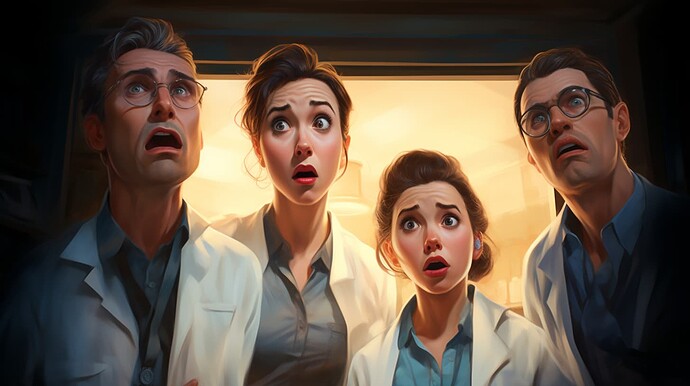Summary:
One of the biggest breakthroughs in treating Long COVID was the Israeli randomized controlled trial showing that HBOT is useful in some long haulers. Yet very few people are talking about it.
Unfortunately, evidence-based medicine isn’t popular when it goes against the way people do things.
Part of the problem is that the many years of medical school are mostly useless when the top treatments include HBOT, extended fasting, and a supermarket food (black seed oil). People don’t study these things in medical school.
As most practitioners cannot offer HBOT to their patients, HBOT isn’t that helpful to them.
Positive tests
One way that alternative practitioners make money is to put patients on tests that will frequently come back positive:
- MTHFR (MTHFR gene variants are fairly commo)
- Heavy metals
- Microclots (most long haulers have levels similar to healthy controls)
- Dodgy tick-borne disease panels
- Etc.
Unfortunately, many patients don’t realize that many medical tests have a fairly high rate of false positives and false negatives. Most medical tests range from somewhat unreliable to useless- especially if they aren’t approved tests that have been properly validated.
Right now, we don’t really have tests that can predict the outcome of treatment. There are a few exceptions to this:
- Pharmacogenetics can predict which people won’t respond to clopidogrel. It can predict drug interactions with certain drugs that are popular among long haulers.
- A POTS diagnosis may spot patients that are more likely to respond to colchicine (??).
- Experimentation with diet might help identify people who are more likely to benefit from dietary changes.
- Patients should be checked for known conditions with known treatments (e.g. celiac disease has a great treatment).
But other than that, I don’t know of any tests that might predict who will respond positively or negatively to HBOT, black seed oil, etc.
Elegant theories
It would be nice if there was a single cause of chronic illness with a clear treatment: microclots, cytokines, persistent SARS-CoV-2, autoimmunity, etc. etc.
What the emerging data is showing is that treatments that help some people will hurt others. This suggests that the anti-responders have some sort of underlying mechanism that results in the opposite response to treatment.
This idea is somewhat foreign to modern medicine. There aren’t many treatments which are recognized as ‘double-edged swords’. (Experimental surgery would be one of them.)
For the most part, there are strong incentives to whitewash and explain away negative outcomes from treatment. It’s uncomfortable for doctors to admit that their patient was hurt, that they don’t know much about the patient’s debilitating health problem, or that they have serious deficiencies in tracking their patients’ outcomes (because it’s hard). In the alternative medicine space, I’m seeing a lot of doctors explain away evidence of treatment going wrong:
- They don’t bother to do a workup for a spirochete bacterial infection when they blame negative symptoms on a ‘Herx’ reaction.
- They blame disconfirming evidence on “detox”.
- Or they just say that their patient ‘recovered’ or that the treatment was a ‘success’. Literally the opposite of what happened.
- The patient didn’t follow the treatment plan.
We really need practitioners who are aware of treatments being double-edged swords. Then we should be able to reduce the harm being inflicted on patients because we can (A) start with low doses and (B) discontinue early. (Though we don’t have a lot of definitive data as to whether long-lasting harm is happening and whether it can be avoided.)
It’ll be a real breakthrough when more people recognize that the current top treatments are double-edged swords. We need more people to embrace the data even if the conclusions are uncomfortable or foreign.
Low response rates aren’t sexy
In the support groups and in the scientific literature, there is an obvious ‘everything works’ problem. Too many people are making bold claims about treating long haul. Inevitably, patients pile onto the latest trend/fad and discover that it doesn’t work for most of them. This has happened in the ME/CFS community many times in the past (e.g. see MEPedia for an overview about low-dose Abilify).
I don’t think that there will be an easy solution to the ‘everything works’ problem. The social media algorithms really encourage people to make sexy clickbait posts. It’s why I don’t tweet much about treatment on Twitter- nobody will see those posts. But, I hope that patients will become wiser over time. And hopefully by putting out content like this, patients will get better at spotting reliable versus unreliable data.
The current reality is that chronic illness isn’t easy to treat. Most people will not recover after trying the top 6 treatments. And then those looking for an answer will have to venture out into somewhat uncharted waters. There’s evidence that antimicrobials will hold the answer and there are a number of them that are fairly safe in healthy individuals (and double-edged swords in chronic illness patients). However, we can expect response rates to be low so it will take a while before the patient discovers treatments that push them in the right direction.
Where medical professionals can add value
As a Canadian, I got access to healthcare through the ‘Dallas Buyers Club’ route. I became my own doctor and obtained prescription drugs without a prescription. Obviously, it’s not ideal. Obtaining drugs is unnecessarily time consuming. I didn’t have time to educate myself about what pharmacists do and to properly research drug interactions- having a pharmacist would have been much safer. There are major problems with patients being their own doctor and pharmacist.
Hopefully the situation gets better in the future.
